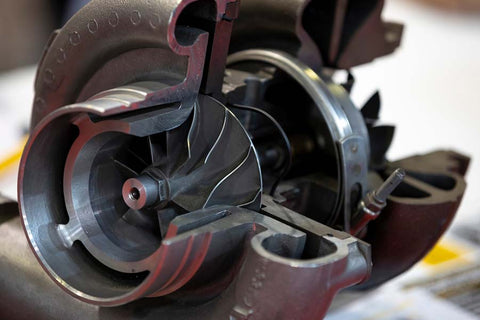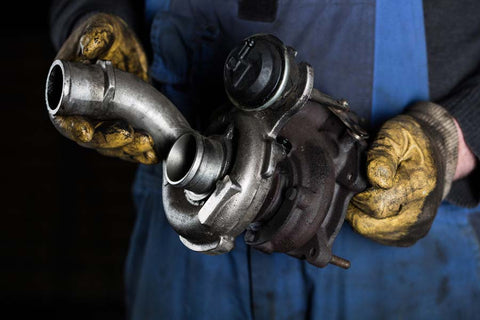Turbochargers are impressive engine boosters that use exhaust gasses to amp up power and deliver a thrilling driving experience. Yet, when car enthusiasts hear strange sounds, they’re eager to pinpoint the cause. Even well-maintained turbos can produce various noises due to their rapid rotations. These sounds, like whistles or odd hums, can either signal normal operation or hint at potential issues, prompting owners to investigate further for optimal performance and peace of mind. So, why do turbos whistle or make unusual noises?
In this article, we’ll elaborate on the complex intricacies of how turbochargers work, evaluating their operation and critical components that produce powerful sounds. Explore the essential role of turbochargers in amplifying engine performance and investigate the phenomenon of a turbo whistle. Understand what makes a turbo whistle, why is your turbo making weird noise when spooling, and when should you be concerned!

Source: shutterstock.com / Photo Contributor: Belish
How Turbochargers Work
Every vehicle needs a good amount of air mixed with fuel to create combustion and generate power. The more air entering the engine, the more power the vehicle gains. This is why you should opt for exceptional turbochargers for sale, as they play a critical role in an engine's power output and efficiency.
Turbos are manufactured with two main parts – the compressor and the turbine, also referred to as the ‘cold’ side and the ‘hot’ side of the turbo. Its operation begins with the exhaust gas from the engine rotating the turbine wheel, which is linked to the compressor wheel via a shaft.
As both components spin, they pressurize fresh, cool air from the atmosphere into the engine, promoting more efficient combustion, allowing more fuel flow, and burning it faster. This ultimately generates additional power for the vehicle, enhancing your engine performance and delivering a thrilling driving experience.
As this cycle continues, the combustion creates more exhaust gas, propelling the turbine and compressor wheel, forcing them to spin faster and further intensify air intake. For safe operation, turbochargers are equipped with a dump valve, whose objective is to redirect excess exhaust and regulate the rotational speed. Thanks to this, turbos can spin at speeds exceeding 100,000 RPM while ensuring optimal performance and safe operation.
Why Do Turbos Whistle
So, why do diesel turbos whistle?
Turbo whistles are the sound you hear when the compressor inside the turbocharger speeds up, a process commonly referred to as “spooling up”. This turbocharger noise is particularly noticeable as the turbocharger begins to kick in, typically at the boost threshold, as you accelerate through the rev range. As the engine speed increases, exhaust gasses flow faster, spinning the turbine wheel and subsequently driving the compressor wheel at higher rotation rates.
The acceleration of the turbo generates a distinctive whistling sound caused by the rapid movement of air through the intake and bearing system. Thus, the whistle serves as an indicator of the turbo’s activation and its contribution to increasing engine power during high operation.
Generally, this operation is safe as it showcases that your turbo is functioning as intended. All turbochargers make some amount of noise, and some drivers may not even notice it. However, you should remain vigilant and address any excessive or unusual noises as they could potentially be symptoms of a number of different problems that all demand further investigation.
What does a turbo whistle sound like
As the name suggests, a turbo whistle sounds like a high-pitched, whirring noise, often described as a faint whistle or whine. While some drivers find this sound can be fairly intrusive, others perceive it as a desirable feature, associating it with performance and power.
In fact, some enthusiasts often go as far as purchasing aftermarket turbo whistler devices that fit inside the exhaust of a vehicle to emulate the sound of the turbo whistle, adding a touch of excitement to their driving experiences.
However, it’s essential to recognize the difference between turbo whistle sounds and noises resembling police sirens or dentist drills. Such unusual noises could potentially mask more serious issues within the vehicle’s engine system that require professional attention.

Source: shutterstock.com / Photo Contributor: J. Lekavicius
When Should You Be Concerned
If the whistling sound from your turbocharger appears to be louder, more noticeable, or changes in any way that could be considered unusual, there are a number of factors that could cause it, indicating problems within the engine. This could include:
- Boost, air, or vacuum leak either on your engine intake or intercooler
- Compressor wheel damage
- Split hoses
- Over-boosting caused by a wastegate fault or poor remap
- Depressurization of the system
- Foreign objects or debris in the engine system
- Wear or damage to the turbocharger
Unusual whistles and noises from the turbo are often due to the violation of tightness in the connections, poorly fixed clamps and seals, and foreign objects entering the airway, which are also commonly accompanied by a noticeable drop in engine power.
If the sounds are also coupled with a change in the exhaust color and increased oil consumption, it may present the possibility that the problem is within the turbocharger itself, like impeller backlash or structural wear.
In such cases, further diagnosis by professionals is essential to identify the exact cause. With a professional approach, you can accurately address any issues with your turbocharger system and ensure optimal performance by conducting proper repairs and maintaining your engine’s efficiency and reliability.
Conclusion
Understanding how turbochargers function provides valuable insights into the reasons behind the turbo noises. You no longer have to wonder why does my turbo whistle after that. Due to the rapid rotation by the compressor and turbine wheel, turbos emit distinctive sounds enthusiasts either find exhilarating or invasive. The resulting high-pitched noises often resemble whistles or whining sounds.
However, it’s important to stay vigilant in case you hear similarities to police sirens or dentist drill sounds, as they may indicate more serious issues within the system.
Recognizing the unusual noises can help you address problems with your turbo promptly, allowing you to mitigate any risk of malfunction or wear to your engine components. Thus, by comprehending the mechanics of your turbochargers and the significance of the whistle noises, you can ensure optimal operation and performance, enjoying the thrill and exhilaration of your driving experiences.
We hope this article has provided you with valuable insights into why do turbos whistle.



